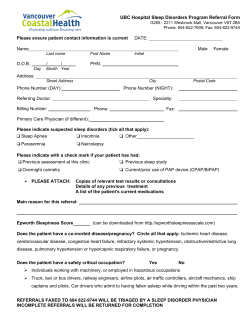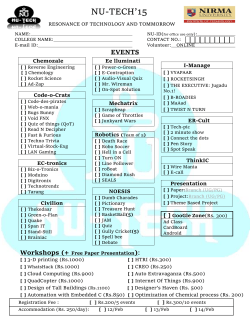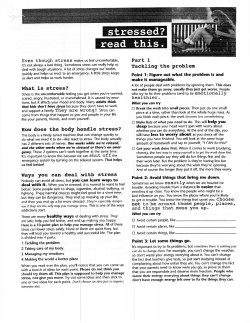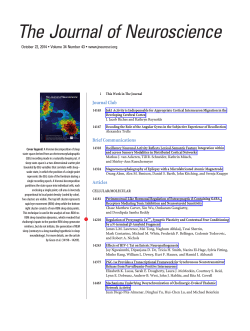
February 2015
Newsletter of Kadlec Neurological Resource Center February 2015 You Balance on One Leg? 2 | Can You May Have Lower Stroke Risk 3 | Library Resources Classes Boost 4 | Music Language Skills, Study Says 5 | February 2015 Calendar AN AUCTION & DINNER TO BENEFIT K A D L E C N E U R O L O G I C A L R E S O U R C E MARCH 20, 2015 | THREE RIVERS CONVENTION C E N T E R 5:30 pm CENTER Before Bedtime Won’t 6 | Alcohol Help Your Sleep, Study Finds 7 | Variété 2015 8 | Neuro Connections / The Basics SEE PAGE 7 FOR AN AMAZING SELECTION OF AUCTION ITEMS YOU WON’T WANT TO MISS! To purchase a table or tickets, visit kadlec.org/knrc. For more information, please call (509) 943-8455. [ T HE R E I S S T R 3 N G T H I N N U M8 E R 5 ] www.kadlec.org/knrc Can You Balance on One Leg? Can You Balance on One Leg? You May Have Lower Stroke Risk Inability to stand on one foot for 20-plus seconds could suggest brain vessel damage, study contends HealthDay News — If you can’t balance on one leg for at least 20 seconds you may be at risk of a stroke, Japanese researchers suggest. Difficulty standing on one leg may indicate that small strokes or tiny bleeds have already occurred, which means the risk for more serious strokes is high, the investigators reported online Dec. 18 in the journal Stroke. “Individuals showing instability while standing on one leg, as well as problems walking, should receive increased attention, as this physical frailty may signal potential brain abnormalities and mental decline,” said lead author Yasuharu Tabara, an associate professor in the Center for Genomic Medicine at the Kyoto University Graduate School of Medicine. Stroke, a leading cause of disability and death, occurs when blood flow to a part of the brain is interrupted because of a clot or bleeding. For the study, Tabara’s team had nearly 1,400 men and women, average age 67, try to balance on one leg for a minute. The researchers also took MRI scans to assess disease in the small blood vessels of participants’ brains, in the form of “silent” strokes - or microbleeds. 2 The researchers found that the inability to balance on one leg for more than 20 seconds was linked to having had tiny strokes or small bleeds in the brain. Balance problems were also associated with reduced thinking and memory skills. Dr. Richard Libman, chief of vascular neurology at North Shore-LIJ Health System in Manhasset, N.Y., said that “narrowing or blockages of tiny blood vessels deep within the brain can give rise to small strokes or tiny amounts of bleeding.” These small strokes, which are a major contributor to mental decline and dementia, have also been associated with walking and balance difficulty and falling, he explained. “The authors of this study have devised a simple test of balance, which seems to be able to reflect ‘small vessel disease’ of the brain,” Libman said. ARTICLE CONTINUED ON PAGE 3 Lower Stroke Risk (cont’d) & Library Resources “This test may be an inexpensive, low-tech method to screen people for small vessel disease who are most likely at risk for further strokes and brain damage,” Libman added. People with brain vessel damage were older, had high blood pressure and thicker neck (carotid) arteries than those who had not had strokes or bleeds, the researchers found. Tabara said that among those who had had two or more tiny strokes, about one-third had trouble balancing. Among those who had had one stroke, 16 percent had trouble balancing. Struggling to stand on one leg for an extended time was also associated with markedly lower scores on memory and thinking tests, the study found. ■ In addition, 30 percent of those with evidence of more than two small bleeds struggled with balance, as did 15 percent of those who suffered one small bleed. – Steven Reinberg, HealthDay Reporter WSU SEEKING STUDY PARTICIPANTS You have an opportunity to participate in a free research project from Washington State University on a video and telephone-based program developed to help with memory, daily living, medication management, mobility, fall prevention, hearing, vision, and communication. WSU is seeking individuals who are 50 or older, caregivers of individuals age 50+, and healthcare professionals working with older adults. Participants will be asked to complete some questionnaires before and after they view three of the videos (medication management, memory, and daily living). The session will last between 90 -120 minutes. Interested individuals can either attend a local group meeting (location TBD) or can also complete the project online at www.tech4aging.wsu.edu. Please contact (509) 335-4033 or WSUtech4aging@gmail.com for more information, or to register. OFFICE & LIBRARY HOURS Monday-Thursday���������������������������������� 9:00am-5:00pm Friday������������������������������������������������������� 9:00am-4:00pm LIBRARY ADDITIONS DYSTONIA Living Well with Dystonia, Danuel Truong, M.D. Surviving Dystonia, Carmine Petringo MINDFULNESS Emotional Renewal Imagery for Caregivers, Lynn Joseph, PhD. The Inner Art of Meditation, Jack Kornfield, Ph.D. A Meditation to Ease Grief, Belleruth Naparstek, M.A. , L.I.S.W. TAI CHI Tai Chi Beginners, Chris Pei Tai Chi Beginners, Paul Lam, M.D. February 2015 3 Music Classes Boost Language Skills... Music Classes Boost Language Skills, Study Says Kids who actively participate show greater thought processing gains HealthDay News — Greater participation in music classes may benefit children’s language development, a new study finds. Researchers followed kids in the nonprofit Harmony Project, which provides music education and instruments to poor children in Los Angeles. Over two years, children who actively participated in the classes showed larger improvements in how the brain processes speech and reading, compared to those with lower levels of participation. Also, the benefits of active participation in music classes occurred in the same areas of the brain that are traditionally weak in children from poor families, according to the study published online Dec. 16 in the journal Frontiers in Psychology. “Even in a group of highly motivated students, small variations in music engagement - attendance and class participation - predicted the strength of 4 neural processing after music training,” lead author Nina Kraus, professor of communication sciences and of neurobiology and physiology at Northwestern University, said in a university news release. “Our results support the importance of active experience and meaningful engagement with sound to stimulate changes in the brain,” she added. Participating in music classes can actually “remodel” a child’s brain in a way that improves the ability to process speech, an ability that’s closely linked to reading, according to researchers. The study finding is important for children from poor families, who process sound less efficiently. This increases the risk that they’ll do poorly in school, Kraus said. “What we do and how we engage with sound has an effect on our nervous system,” she said. “Spending time learning to play a musical instrument can have a profound effect on how your nervous system works.” ■ – Robert Preidt www.kadlec.org/knrc February 2015 SUNDAY 1 MONDAY 2 TUESDAY 3 4 MS SUPPORT 2:00 pm 8 9 WEDNESDAY 5 15 16 PARKINSON’S 1:30 pm 22 23 CAREGIVERS (MEN ONLY) 12:30 pm 17 12 18 24 AMYOTROPHIC LATERAL SCLEROSIS (ALS) WED, FEB 25 @ 12 pm | Location: Oak Room ART EXPRESSIONS WED, FEB 11 @ 10 am | Location: Oak Room Please RSVP by calling (509) 943-8455 for this group as there is only space and supplies for eight attendees. CAREGIVERS Caregivers (for all caregivers) TUE, FEB 17 @ 1:00 pm | Location: Oak Room Caregivers (for men only) MON, FEB 23 @ 12:30 pm at Callaway Gardens 5505 West Skagit Court, Kennewick Light meal served, RSVP is requested (509) 783-5433 Caregivers (for Dementia/Alzheimer’s caregivers) FEB 19 & 24 @ 5:30 pm Both of these groups meet at Callaway Gardens 5505 West Skagit Court, Kennewick Light meal served, RSVP is requested (509) 783-5433 CHRONIC FATIGUE IMMUNE DEFICIENCY SYNDROME/FIBROMYALGIA TUE, APR 14 @ 1:30 pm | Location: Sycamore Room This group will now meet quarterly. The next meeting will be April 14th at 2:00 pm in the Sycamore room. 14 MINDFULNESS 2:30 pm 20 21 MINDFULNESS 2:30 pm ALZ/DEM CAREGIVERS 5:30 pm 25 ALZ/DEM CAREGIVERS 5:30 pm MTHFR BASICS SUPPORT GROUP 1:30 pm PARKINSON’S SUPPER GROUP 5:30 pm STROKE 3:00 pm 7 13 19 CAREGIVERS 1:00 pm SATURDAY MINDFULNESS 2:30 pm TBI SUPPORT 3:00 pm ART EXPRESSIONS 10:00 am FRIDAY 6 POST POLIO 1:00 pm 11 10 THURSDAY 26 ALS SUPPORT 12:00 pm SPINAL DISORDERS 4:00 pm CHRONIC PAIN FRI, APR 17 @ 1:30 pm | Location: Maple Room This group will now meet quarterly. The next meeting will be April 17th at 2:00 pm. MINDFULNESS FRI, FEB 6, 13, 20, 27 2:30 pm | Location: Oak Room We will listen to “The Wisdom of Your Cells: How Beliefs Control Your Biology by Bruce Lipton, PhD. Hidden connections between our biology, psychology and spirtuality are examined by this cellular biologist in the new study of “epigenetics” showing research that dances between mind and matter. MTHFR SUPPORT GROUP THUR, FEB 12 @ 1:30 pm | Location: Sycamore Room MULTIPLE SCLEROSIS TUE, FEB 3 @ 2 pm | Location: Oak Room 27 28 MINDFULNESS 2:30 pm POST POLIO WED, FEB 4 @ 1:00 pm | Location: Maple Room Cleeann Johnson, Registered Dietitian, Lourdes Counseling Services, will speak on nutrition with emphasis on our overachiever and physical challenges (easily/overly fatigued, swallowing, need more protein, etc.). We expect very practical and useful tips, etc. including ideas for easy to prepare, high energy (but not fattening!) menu ideas. SPINAL DISORDERS WED, FEB 25 @ 4:00 pm | Location: Sycamore Room STROKE TUE, FEB 17 @ 3pm | Location: Maple Room TRAUMATIC BRAIN INJURY WED, FEB 4 @ 3 pm | Location: Maple Room PARKINSON’S MON, FEB 16 @ 1:30 pm | Location: Sycamore Room PARKINSON’S SUPPER GROUP Please call Wendy at (509) 619-0301 to RSVP. There is no agenda to this meeting other than getting together and having fun! February 2015 5 Alcohol Before Bedtime Alcohol Before Bedtime Won’t Help Your Sleep, Study Finds Researchers advise against using booze to help get shut-eye HealthDay News — As many as one in five Americans turns to alcohol sometimes to help them fall asleep, but that can lead to sleep problems later in the night, a new study finds. This is because alcohol hampers the brain’s system for regulating a person’s need for sleep, researchers found. “The prevailing thought was that alcohol promotes sleep by changing a person’s circadian rhythm - the body’s built-in 24-hour clock,” study lead author Mahesh Thakkar, an associate professor and director of research in the neurology department at the University of Missouri School of Medicine, said in a university news release. “However, we discovered that alcohol actually promotes sleep by affecting a person’s sleep homeostasis - the brain’s built-in mechanism that regulates your sleepiness and wakefulness,” Thakkar said. Alcohol’s effect on sleep homeostasis can lead to poorer quality sleep, according to the study published recently in the journal Alcohol. 6 Study co-author Dr. Pradeep Sahota said, “Based on our results, it’s clear that alcohol should not be used as a sleep aid.” Sahota is chair of the neurology department at the University of Missouri School of Medicine. “Alcohol disrupts sleep and the quality of sleep is diminished. Additionally, alcohol is a diuretic, which increases your need to go to the bathroom and causes you to wake up earlier in the morning,” Sahota explained in the news release. Thakkar pointed out that sleep is an important area of study. “Approximately one-third of our life is spent sleeping. Coupled with statistics that show 20 percent of people drink alcohol to sleep, it’s vital that we understand how the two interact,” he said. “If you are experiencing difficulty sleeping, don’t use alcohol. Talk to your doctor or a sleep medicine physician to determine what factors are keeping you from sleeping. These factors can then be addressed with individualized treatments,” Thakkar advised. ■ – Robert Preidt www.kadlec.org/knrc Variété 2015 SPONSORS SPONSORS MARCH 20 THREE RIVERS CONVENTION CENTER Stan Spohr AN AUCTION & DINNER TO BENEFIT KADLEC NEUROLOGICAL RESOURCE CENTER To purchase a table or tickets, visit kadlec.org/knrc. For more information, please call (509) 943-8455. AUCTION ITEMS AMA’S Attend the American Music Awards in Los Angeles and enjoy the show celebrating your favorite recording artists like Lady Gaga, Rihanna and One Direction live and in person. Your trip will include two Mezzanine tickets to the 43rd Annual American Music Awards at the Nokia Theater and two nights stay at the luxurious Beverly Wilshire Hotel in Beverly Hills, CA. (Date TBD). CHEF’S TABLE Enjoy a 5-course dinner with wine flights for six. It will be held in the kitchen at Three Rivers Convention Center on a mutually-agreed upon date. Meet, greet and watch Chef Lyle prepare your customized meal. BRACES U.S. OPEN NEIL DIAMOND Attend the U.S. Open at Chambers Bay in Tacoma, WA on June 19-21, 2015. Your adventure includes two all-day Trophy Club passes on Saturday, June 20 and Sunday, June 21st with access to the Trophy Club Hospitality Tent, and on-site, air-conditioned pavillon with live U.S. Open Coverage, located just to the right of the 8th green and 16th fairway. Three nights at the Seattle Shafer Baillie Mansion Bed and Breakfast are included. Neil Diamond, iconic Grammy Award®-winning Rock and Pop Singer/ Songwriter and Rock and Roll Hall of Fame member, will embark on his highly anticipated NEIL DIAMOND TOUR 2015, which will come to Seattle’s KeyArena on May 10. Includes a one night stay at the Westin. This item donated by Pam Knutson, KNRC Board Member. BAVARIAN WEEKEND IN LEAVENWORTH LEONETTI CELLARS & FIGGINS Spend your days hiking, golfing, or strolling the shoplined streets of this quaint Bavarian village on September 18-20 in a spacious two bedroom condo (sleeps up to 6). Figgins Family Wine Estates has donated two magnums: An etched, handpainted magnum of Leonetti Cellar 2011 Sangiovese and FIGGINS 2011 Estate Red Wine. KESTREL PRIVATE WINE GOURMET CHEESE TOUR Spend the afternoon at Kestrel Vintners exploring the world of wine and gourmet cheese perfectly paired with our award winning wines (Prosser or Woodinville tasting room). VARIÉTÉ GUEST OF HONOR: Scott Ostler, DDS, MSD, has generously donated a full set of orthodontia for the 11th year in a row! For any age! Honoree, Bob De Lorenzo personifies “Count on Me.” Bob came to KNRC as a client when he was caring for his wife with Alzheimer’s disease. Bob is a committed KNRC Board Member who strives to increase awareness of our resources, and cherishes his role as caregiver support group leader. Please join us in honoring Bob De Lorenzo by attending Variété on March 20, 2015. February 2015 7 NEURO CONNECTIONS NONPROFIT ORGANIZATION U.S. POSTAGE PAID PERMIT No. 178 SALEM, OR NATIONAL MS SOCIETY The National MS Society is doing an event on Saturday, February 21st from 10:00 am -12:00 pm entitled “North American Education Program: Mood and Cognition”. The speaker is Dr. Yashma Patel, MD, from the Rockwood Clinic in Spokane, WA. It will be held at the Three Rivers Convention Center. To register, please call 1 (800) 344-4867 and press option 1. 1268 Lee Boulevard Richland, WA 99352 (509) 943-8455 www.kadlec.org/knrc FAMILY EPILEPSY SOCIAL Friday, February 20th, 6:30 pm at the Pasco Round Table Pizza. Co-sponsored by The ARC and the Epilepsy Foundation. RSVP to Melissa Brooks, (509) 783-1131, ext. 108 KNRC BOARD & STAFF 2015 BOARD OF DIRECTORS Jodi Melland, Chair Pam Knutson, Vice Chair Steve Arneson, Treasurer Debra Lang-Jones, RN, Secretary Bob De Lorenzo Terry Marie Fleischman Yosen Liu, PhD Chris Rawlins, RN Kirk Ruehl, MDiv Michael Turner, MD KADLEC OFFICERS Rand Wortman, CEO, Kadlec Regional Medical Center Glenn Welch, Vice President Resource Development STAFF Karen Hayes, MA, Executive Director Heidi Hill, MHA, Office Coordinator Sue Linn, Program Assistant Sue Pinard, Resource Librarian Cathy Manderbach, Office Assistant 8 Tuesday, Feb. 24, 2015 1 to 3 p.m. Kadlec Healthplex Sycamore Room 1268 Lee Blvd., Richland, WA Presented without charge and open to the public For information or to register, call (509) 943-8455 or visit www.kadlec.org/knrc www.kadlec.org/knrc This workshop is co-sponsored by
© Copyright 2025









